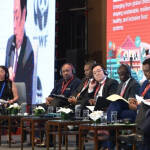Higher rates are making it more difficult to raise capital for marginal but vital green projects. Years of cheap money, a combination of quantitative tightening, and a $30 trillion mark-down in the value of stocks and bonds last year have reduced liquidity, and the double-blow of definitional confusion and greenwashing has made investors warier than ever.

Some of these factors are beyond the control of governments, let alone the financial services industry, but it is within our power to collaborate to create more transparent systems that facilitate green investment by reducing risk.
This should become easier as new regulations come into force. The European Union has already brought in rules on disclosures relating to green finance, and China, the United States, and Britain have all proposed new measures to promote robust standards.
Asia’s financial centres have everything to play for. Green finance is still in its infancy, and the city or market that can attract the growing number of investors focused on environmental, social, and governance (ESG) standards will win a first-mover advantage.
But the region risks losing ground to jurisdictions like the EU, which are aiming for global leadership in designing the policy and regulatory framework for delivering net-zero. Where should Asia direct its efforts, and what can it learn from the European experience? For example, the EU was among the first to introduce a classification system to assess the sustainability of investments – a so-called taxonomy – and, more recently, has tightened up its disclosure rules. How should Asia respond if it wants to attract those ESG-focused investors?
Firstly, there is little doubt that well-designed disclosure rules will help create confidence about what constitutes a sustainable investment. A clear, widely adopted, and well-policed taxonomy will not only give investors confidence in the sustainability of the projects they support, it will also give project managers a design roadmap.
The EU has gone further, creating sustainable finance disclosure regulations intended to make financial market participants provide the information end-investors need to make informed decisions. These regulations should encourage both more sustainable investing practices and a more transparent and therefore liquid secondary market in green financial products.
Regulators and the financial services industry should press on with finding ways to bring more transparency to the market, and to standardise the reporting of ESG risks. But careful design of regulation is also essential to avoid creating fragmentation and confusion. Better information will help avoid risk mispricing and will mobilise market forces towards scaling up green financing, helping to make it mainstream.
It is important, however, to avoid creating a patchwork of regulation or too many ad-hoc standards for green products, since this will reduce the market’s efficiency and deter issuers and investors alike.
Governments and regulators can and should set minimum standards on disclosure and enact penalties for misleading investors on sustainability. But if we are to achieve the liquid market in sustainable products the world needs, policymakers should work with the financial services industry to make sure these ground rules are both user-friendly, and successfully target the real problems in growing the market.
For all the potential of green investment, it is widely recognised that it is a shortage of sustainable assets, not sustainable finance, which is the major impediment to growth.
Taxonomies have a role to play but they need to avoid creating excess complexity or setting standards that mean only the very greenest of green activities or entities are in scope. Better disclosure is key, but regulators should work to ensure international sustainability standards – such as those being finalised by the International Sustainability Standards Board – are embedded in national or regional frameworks.
Above all, it is important to remember that in product design, well-established market standards, such as ICMA’s Green Bond Principles, have made a significant contribution and should be built upon. Newer market standards – such as the FAST-Infra labelling scheme HSBC and others launched – also can help investors to identify what constitutes sustainable infrastructure. This is crucial to Asia and other emerging markets, where the battle against climate change will be won or lost.
Banks and other makers and traders of green financial products must work with the public sector on regulation to help clarify and refine definitions for sustainable assets and provide comprehensive, transparent, and rapid ways to rate climate risk. We need to invest in training and hiring talent that can assess and manage these risks and, importantly, help customers seize the opportunities in the transition to net-zero.
Mobilising the trillions of dollars needed will require rapid acceleration of sustainable investment flows. The financial services industry must play its part in moving from the bespoke, artisanal processes in use today, to assembly line manufacturing of green financial products based on a common language and backed up by robust and clear disclosure rules.
David Liao




